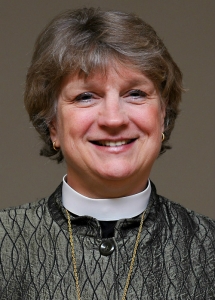 By Bishop Ann Svennungsen
By Bishop Ann Svennungsen
What is the first thing you will do once the pandemic subsides? Will you take a family reunion? Are you longing for in-person worship? Do you want to take a trip to someplace fun and unusual?
There’s so much I yearn to do once restrictions are lifted and we can return to “normal.” And yet, in this surreal space of restrictions and waiting, I challenge us to think whether “returning to normal” is what we truly want – or what our global home can bear.
“We have been charged to be caretakers of creation.”
In his opinion piece in the January 25 edition of The New York Times, Roy Scranton, Notre Dame professor and director of its Environmental Humanities Initiative, describes this challenge more succinctly and powerfully than I. He writes:
It’s easy to forget that 2020 gave us not just the pandemic, but also the West Coast’s worst fire season, as well as the most active Atlantic hurricane season, … huge wildfires in both the Amazon and the Arctic, … the collapse of the last fully intact ice shelf in the Canadian Arctic, and increasing odds that the global climate system has passed the point where feedback dynamics take over and the window of possibility for preventing catastrophe closes. …
More alarming, recent observed increases in atmospheric methane, a greenhouse gas more than 80 times stronger than carbon dioxide over the short term, are so large that if they continue they could effectively overwhelm the pledged emissions reductions in the Paris Agreement, even if those reductions were actually happening. Which they’re not.
According to the climatologist Michael Mann, “The more observations we get, the more sophisticated our models become, the more we’re learning that things can happen faster, and with a greater magnitude, than we predicted just years ago.”
Going back to normal now means returning to a course that will destabilize the conditions for all human life, everywhere on earth. Normal means more fires, more category 5 hurricanes, more flooding, more drought, millions upon millions more migrants fleeing famine and civil war, more crop failures, more storms, more extinctions, more record-breaking heat. Normal means the increasing likelihood of civil unrest and state collapse, of widespread agricultural failure and collapsing fisheries, of millions of people dying from thirst and hunger, of new diseases, old diseases spreading to new places and the havoc of war. Normal could well mean the end of global civilization as we know it.
Spurred on to read more perspectives on the looming crisis, I have already reserved my copy of How to Avoid a Climate Disaster by Bill Gates – a more optimistic spirit than Roy Scranton – and pray I will find more heartening news about the way forward.
AND YET, I DON’T imagine even Bill Gates can promise that returning to “normal” can prevent the crisis before us. Again, in the words of Professor Scranton:
In March last year, watching an unknown plague stalk the land, I felt fear, but I also felt hope: the hope that this virus, as horrible as it might be, could also give us the chance to really understand and internalize the fragility and transience of our collective existence. I hoped we might recognize not only that fossil-fuel-driven consumer capitalism was likely to destroy everything we loved, but that we might actually be able to do something about it.
What can we do?
- First, we must find ourselves centered in the reality that our cloud of witnesses have often faced overwhelming events. Surround yourself in the awareness that you can’t do it alone, even though you do have a part to play.
- Find others in your congregation or as part of the synod’s EcoFaith team to think strategically about how to address the problem in those places where you are able.
- Consider other voices – marginalized voices – as you become engaged. It is just such listening that informs my thinking about addressing the Line 3 construction.
- Become better equipped to discuss the challenge before us. Perhaps you can find people who will read both the books by Bill Gates and Roy Scranton with you.
- Find tangible ways that make some difference (even though it is not enough in-and-of-itself). While spending untold hours in our home, we discovered that air-drying our clothes can reduce the average household’s carbon footprint by 2,400 pounds a year. (Sometimes, during my Zoom calls, you can see those clothes hanging on the line my husband Bill created.) You will feel more empowered to take on bigger issues when you have “skin in the game.”
“Consider other voices – marginalized voices – as you become engaged.”
We have been charged to be caretakers of creation. Today, we are becoming more aware that we are part of creation, and that our caretaking must sometimes mean undoing harm we have caused. We can become overwhelmed to the point of inaction by this realization. But, together as a community of faith, we can follow a shared calling to be healers of the breach. Together, we can dream that, though our collective existence may be fragile, the future is yet unwritten and we are co-creators by our thought, words, and deeds.
May we all be filled with the hope that the One who creates also re-creates in the moments when that is most necessary, … and the re-creation includes us.

